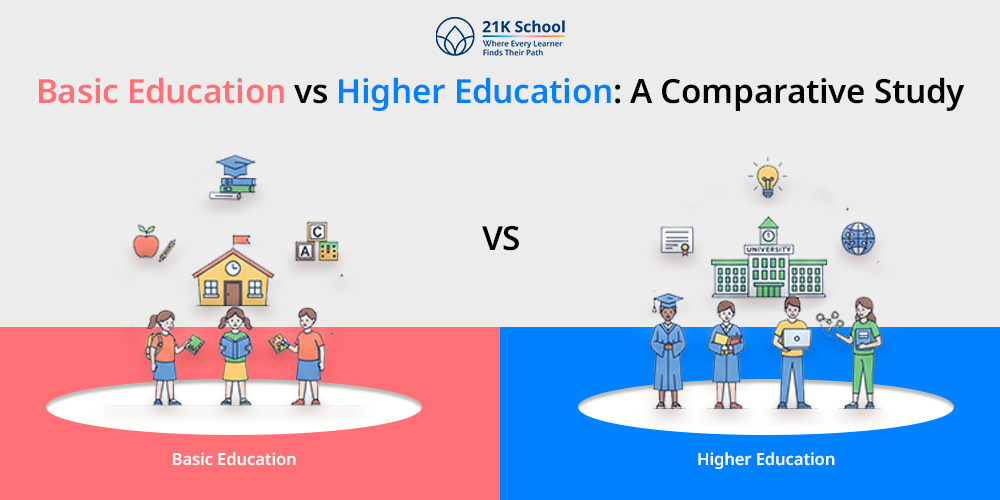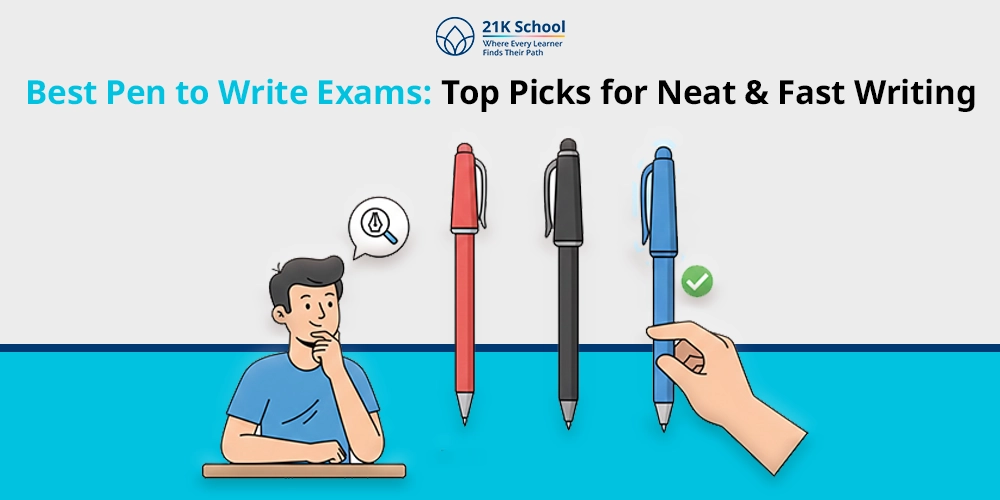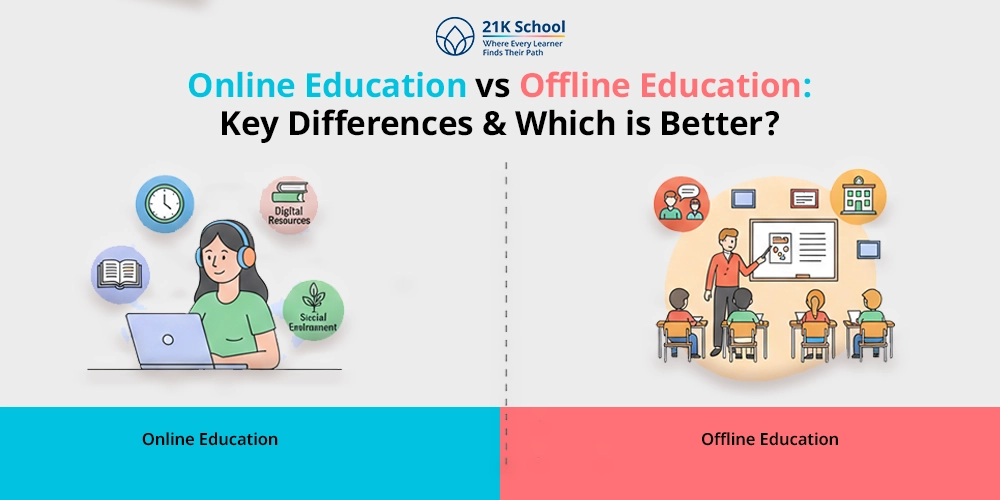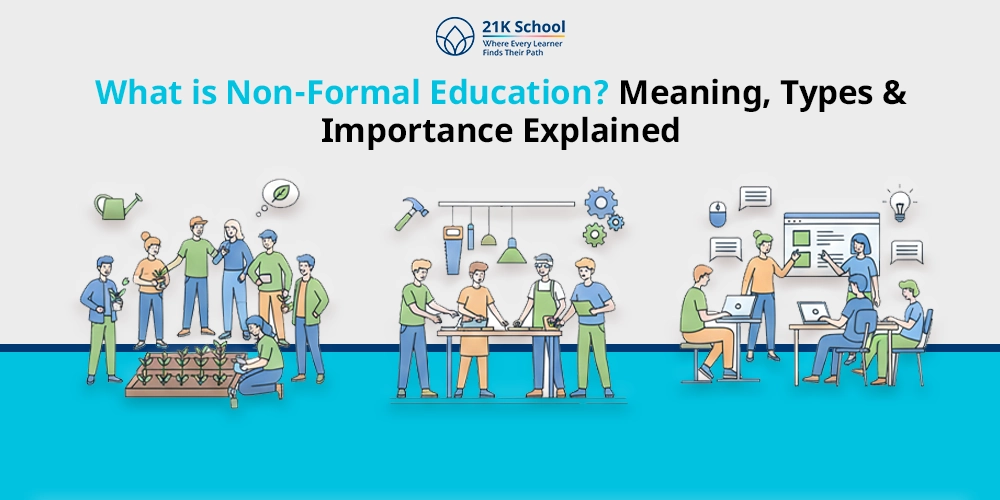
We become successful individuals in life and in career due to mixed forms of learning , including basic education and higher education.
Basic education is the primary level and secondary level of education that refines our basic numerical skills, communication skills , reading skills , and critical thinking .
Higher education is more seen to be focused on providing specialized learnings for being career ready and boost our earnings.
We will here understand basic education vs higher education and how it differentiates on the basis of stages, goals, outcomes, etc.
Contents
Basic Education vs Higher Education: Key Differences
To put it clearly, basic education fosters basic life skills along with preparing you for higher learning. While higher education completes in colleges and universities focusing on your future jobs of the 21st century .
Let’s understand the major differences through a table.
| Aspect | Basic Education | Higher Education |
| Stage | Preschool to Senior Secondary (K–12) | Undergraduate to Postgraduate and Doctoral levels |
| Goal | To develop literacy, numeracy, and life skills for all | To impart advanced knowledge, research ability, and professional skills |
| Instruction | Teacher-centered; structured lessons | Learner-centered; emphasis on independent and critical learning |
| Curriculum | Broad, general, and standardized | Specialized and discipline-specific |
| Evaluation | Continuous assessment, tests, and standardized exams | Research papers, dissertations, practicals, and peer review |
| Learning Environment | Highly guided and supportive | Flexible, autonomous, and research-oriented |
| Outcome | Functional literacy, basic competencies, social and moral development | Academic degrees, professional qualifications, and advanced expertise |
1. Stages
- Basic Education: Basic education is basic formal education (usually preschool, primary, and secondary education). It starts with the initial learning in literacy and numeracy and continues to general academic subjects in the middle and senior levels.
- Higher Education: After schools, higher education starts and involves undergraduate, postgraduate and doctoral studies. It is administered in universities, colleges and expert institutions that offer higher learning, research, and professional degrees in various subjects.
2. Goal
- Basic Education: The primary objective of basic education is to provide universal literacy, numeracy and social development. It seeks to inculcate the necessary knowledge, moral values, and life skills as the foundation of subsequent learning.
- Higher Education: Higher education aims at facilitating intellectual, critical, and specialization. It equips people with professional jobs, leadership, and research input that leads to social and economic growth.
3. Instructions
- Basic Education: Basic education teaching is usually one-sided, based on the structured lessons, repetitions, and directed learning. In the provision of information and tracking progress to ensure the basis of understanding, teachers take a key central role.
- Higher Education: Instruction in higher learning becomes student-centered and focuses on independent study, discussion and analysis. As facilitators and mentors, the professors help to expect students to listen to the topics, ask questions, and build their own points of view.
4. Curriculum
- Basic Education: The basic level curriculum is generalized and standard since it encompasses languages, mathematics, science and social studies. It strives to form general knowledge , values and cognitive skills in many fields.
- Higher Education: Higher education is more specialized in the curriculum taught. Learners choose areas of interest or career objectives, pursue more intensive study, research and practice which allow them to strengthen their knowledge.
5. Evaluation
- Basic Education: Testing in fundamental education is normally the continuous assessment, written assessment and standardized assessment. It is concerned with testing understanding, recall and simple learning, and use of knowledge.
- Higher Education: Higher education evaluations are more complex and entail research projects, dissertations, presentations, and practical exams. It focuses on critical thinking, innovativeness, and practical application of theoretical knowledge to solve real life issues.
6. Learning Environment
- Basic Education: The basic education learning environment is much structured and facilitated where emotional and academic support are offered. These classes promote interactivity and teamwork among the students under intense teacher-student supervision.
- Higher Education: Universities encourage a free and independent atmosphere. Libraries, laboratories, digital resources and research facilities are available to students that promote self-directed learning and exploration of intellectual activities.
7. Outcomes
- Basic Education: The end product of a basic education is a socially responsible and literate person who has the basic essential skills of life and with values of morality. It provides the background in which additional study can be accomplished.
- Higher Education: Higher learning results in a well-informed, skilled, and critical learner who can make contributions to the research, innovation, and career spheres. It delivers graduates who are prepared to take up superior jobs and leadership in the society.
What is Basic Education?
Basic education is a system of formal education including early childhood, primary, and secondary education- commonly known as the K-12.
It is universally known that it is one of the basic human rights and a key factor in personal and national progress.
Basic education helps a child to gain knowledge and skills required to be functional in society.
Basic education is concerned with the development of literacy, numeracy, communication, critical thinking, and moral value.
It will form the intellectual and emotional foundation on which further education and lifelong learning can be formed.
Basic education in most countries is mandatory and publicly allowed, which means that all children irrespective of their backgrounds have access to good education opportunities.
Objectives of Basic Education
The main goals of basic education comprises:
- Progress in literacy and Numeracy: To make sure that every learner is able to read, write, and do simple arithmetic, which will allow them to engage in everyday activities and further education.
- Cognition and Social Development: To become a problem solver, reasoner and interpersonal skills responsible for personal growth and citizenship.
- Moral and Ethical Values: To develop values like respect, student discipline , empathy and social responsibility.
- Physical and Emotional Well-being: To encourage healthy lifestyle, physical and emotional stability through holistic development.
- Higher Learning Preparation: To deliver the educational background that can aid the individual in his or her transition to higher education or vocational training.
- Civic Awareness: To instill the concept of community, environment, and national identity, promote active citizenship.
Basic education is therefore the foundation of lifetime learning as it prepares the human being to both succeed in their studies and also be able to contribute to a democratic and productive society.
What is Higher Education?
Higher education is the next level of learning after one has completed secondary education.
It comprises undergraduate, postgraduate, and doctorate programs at the universities, colleges and specialized institutions.
It is a process of intellectual investigation, innovation, career development and research that makes contributions to economic growth and the development of the society.
Colleges and universities are important in terms of generating qualified professionals, researchers and leaders who are able to deal with complex issues in the globalized world.
Higher education, unlike basic education which is standardized, is diverse and specialized and involves addressing the interests and career goals of the diverse learners.
Objectives of Higher Education
The list of objectives of higher learning mentions as:
- High Level of Knowledge and Specialization: To equip knowledge and insights in particular fields of study or career.
- Research and Innovation: To create new knowledge by way of research, experimentation and creative inquiry contributing to the development of science and the society.
- Skill Development: To gain analytical, technical, and leadership competencies that are applicable in the international labour market.
- Thinking Level and Intellectual Development: Encouraging independent and reflective thinking in order to make the students question, analyse and synthesize information.
- Professional and Ethical Competence: To equip graduates to be responsible and ethical in their professional lives.
- Contribution to the society including economy: To have graduates that would contribute to the national development, innovation and sustainable development.
- Global and Cultural Awareness: To promote cross cultural cooperation and international understanding in an ever-broken down world.
Higher education is thus the driver of national competitiveness and innovation. It assists youngsters in specialization with their careers, equips them with intellectual skills and societal leadership which would last through their lifetime.
Conclude It
Basic and higher education is a constituent part of an all inclusive education system.
Both levels are closely interdependent on each other, since without good basic education high education cannot accomplish its objectives.
Besides that you should note that some European countries have different grade structures and some don’t use the K-12 terminology. So, for the Anglo-American model of education, a basic differentiation between the basic education and higher education is this.
Balanced focus on the two tiers is important in individual empowerment, economic and social justice. This is because, in the end, the success of a country lies in the effectiveness of elementary and higher education in developing knowledgeable, skilled and responsible citizens.



